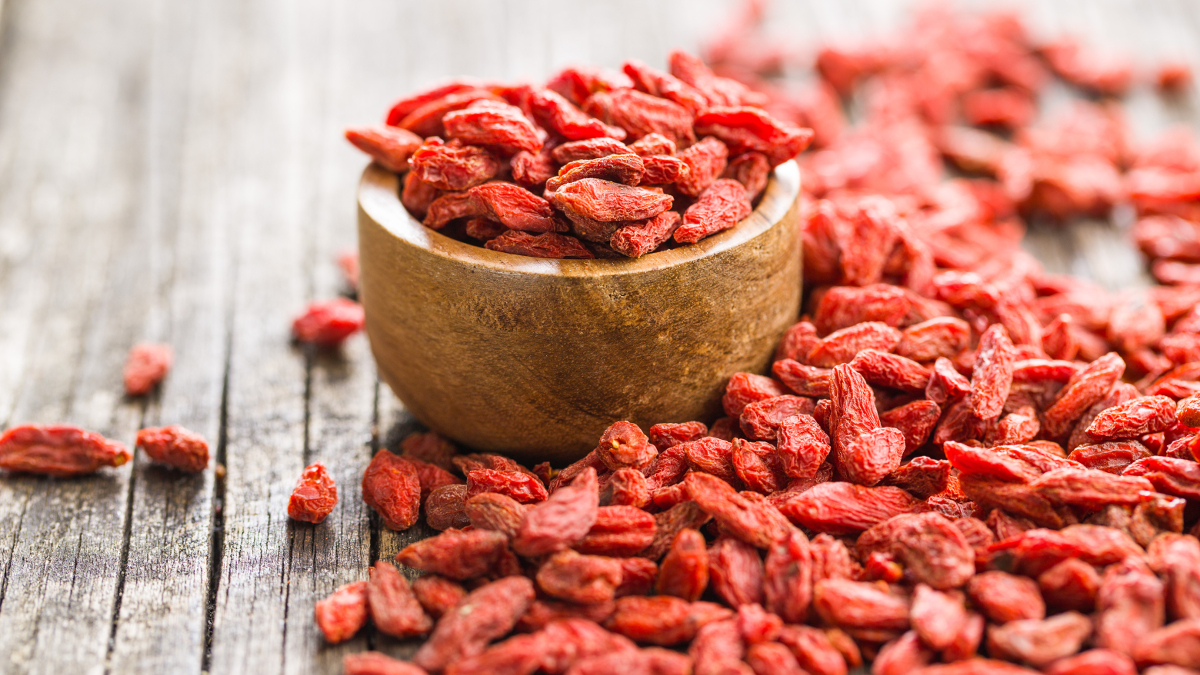The multiple benefits of goji berries
A superfruit used for more than 2000 years in traditional Chinese medicine, the goji berry has become increasingly popular in the West because of its high content of vitamins and antioxidants. Discover its various benefits.

A superfruit high in vitamins, trace elements and amino acids
Goji berries come from one of two species of the boxthorn shrub (Lycium chinense or barbarum). They contain a wide variety of nutrients and micronutrients:
- multiple vitamins (C, B1, B2, E...) ;
- 21 trace elements (zinc, copper, phosphorus...) ;
- 18 amino acids(leucine, lysine, valine...) ;
- fibre;
- proteins...
With almost 50mg per 100g of fresh fruit, goji berries are an excellent source of vitamin C, one of the most important vitamins for human health. Also known as ascorbic acid, vitamin C helps to maintain the immune system, promote collagen formation and reduce fatigue, etc. (1)
Vitamin C is also a powerful antioxidant. Indeed, when it comes to antioxidants, the goji berry has more than its fair share.
The goji berry: a veritable antioxidant cocktail
Regularly referred to in magazines as a superfood, the goji berry appears to offer a veritable wealth of antioxidants, according to an increasing number of studies. In particular, it contains carotenoids and polysaccharides, which it seems are responsible for its antioxidant effects. (2) As one study commented, “the goji berry has been identified as an important source of antioxidant compounds, with properties beneficial for health”. (3)
Indeed, in traditional Chinese medicine, the goji berry has been associated with anti-aging effects, no doubt because of its antioxidant compounds which help fight the aging process. Goji berries have even been called “the fruit of eternal youth”.
Other potential benefits of the goji berry: brain, eye and heart health ...
Other properties are still being investigated. One recent study looked at the effects of a goji berry extract-based treatment on neuroplasticity of the prefrontal cortex and hippocampus in aged subjects. The treatment (3g of goji berries per kilo of bodyweight, for 60 days) resulted in a significant increase in dendritic morphology in these two regions of the brain, and greater immunoreactivity. (4)
The prefrontal cortex plays a decisive role in regulating mood, while the hippocampus is instrumental in the management of memory and awareness of the past. This study thus positions goji berry extract as a potential supplement for the brain.
In addition, the dendritic cells mentioned in this study are a population of leukocytes with original properties, involved in innate and acquired immunity (5). This would seem to support the use of goji berries in traditional Chinese medicine as an immunostimulant.
Another recent study evaluated the effect of a goji berry extract on abnormal breast cells. These trials not only demonstrated the extract’s absence of toxicity but also noted its ability to act against deviant cells. (6) However, there is a need for further expansion of research into goji berries. It has traditionally been associated with positive effects on vision, sexual function, cardiac health and glycaemia. (7-11)
Goji berry extract and synergistic supplements
In summary, goji berries constitute an excellent, natural health ally, with their high content of pro-immunity vitamin C, minerals and antioxidants. If you want to maximise your intake, a good option is to consume them in the form of a dietary supplement (such as Goji Berry Extract). This can be happily combined with other supplements too, including turmeric and vitamin D.
References
- https://efsa.onlinelibrary.wiley.com/doi/abs/10.2903/j.efsa.2009.1226
- Skenderidis P, Lampakis D, Giavasis I, et al. Chemical Properties, Fatty-Acid Composition, and Antioxidant Activity of Goji Berry (Lycium barbarum L. and Lycium chinense Mill.) Fruits. Antioxidants (Basel). 2019;8(3):60. Published 2019 Mar 10. doi:10.3390/antiox8030060
- Goji berry fruit (Lycium spp.): antioxidant compound fingerprint and bioactivity evaluation, D. Donno, G.L. Beccaro, M.G. Mellano, A.K. Cerutti, G. Bounous, Journal of Functional Foods, October 2015, https://doi.org/10.1016/j.jff.2014.05.020
- The treatment of Goji berry (Lycium barbarum) improves the neuroplasticity of the prefrontal cortex and hippocampus in aged rats, Ana Karen Ruíz-Salinas, Rubén A Vázquez-Roque, Alfonso Díaz, Guadalupe Pulido, Samuel Treviño, Benjamín Floran, Gonzalo Flores, in The Journal of Nutritional Biochemistry, September 2020, https://doi.org/10.1016/j.jnutbio.2020.108416
- http://acces.ens-lyon.fr/acces/thematiques/immunite-et-vaccination/thematiques/reponse-immunitaire/comprendre/immuniteinnee/cd-types-et-fonctions
- Anna Wawruszak, Arkadiusz Czerwonka, Karolina Okła & Wojciech Rzeski (2016) Anticancer effect of ethanol Lycium barbarum (Goji berry) extract on human breast cancer T47D cell line, Natural Product Research, 30:17, 1993-1996, DOI: 10.1080/14786419.2015.1101691
- Bucheli P, Gao Q, Redgwell R, et al. Biomolecular and Clinical Aspects of Chinese Wolfberry. In: Benzie IFF, Wachtel-Galor S, editors. Herbal Medicine: Biomolecular and Clinical Aspects. 2nd edition. Boca Raton (FL): CRC Press/Taylor & Francis; 2011. Chapter 14. Available from: https://www.ncbi.nlm.nih.gov/books/NBK92756/
- Bone R.A, Landrum J.T, Guerra L.H, Ruiz C.A. Lutein and zeaxanthin dietary supplements raise macular pigment density and serum concentrations of these carotenoids in humans. J Nutr. 2003;133:992–8.
- Sohn D.W, Kim H.Y, Kim S.D, editors. et al. Elevation of intracavernous pressure and NO-cGMP activity by a new herbal formula in penile tissues of spontaneous hypertensive male rats. J Ethnopharmacol. 2008;120:176–80.
- Li W, Dai S.Z, Ma W, Gao L. Effects of oral administration of Wolfberry on blood superoxide dismutase (SOD), hemoglobin (Hb) and lipid peroxide (LPO) levels in old people. Chin Trad Herb Drugs. 1991;22:251–68.
- Wu H, Guo H, Zhao R. Effect of Lycium barbarum polysaccharide on the improvement of antioxi-dantability and DNA damage in NIDDM rats. Yakugaku Zasshi. 2006;126:365–71.
Keywords
5 Days
great products and prices
great products and prices
Marie
11 Days
Easy to navigate site
Easy to navigate site, had what I was searching for, good price. easy order-check out
James Tucker
17 Days
My skin is clearing up nicely!
Pretty good for my skin so far.
Christian
19 Days
The new packaging is excellent
The new packaging is excellent - finally! No more squashed boxes and torn envelopes.
GORAN
20 Days
Great Product
Great Product
Larry Garrett
25 Days
Quick shipping
Quick shipping; good price. No issues!
Mary McCarty
26 Days
Thr product is very good and is helping…
Thr product is very good and is helping me on my health. Then is always on time
LUGO Luz
29 Days
Buying was fine
Buying was fine. I had problems with the website not recognizing my login info, and had to call to get it fixed. Other than that, everything was good.
David S. Clark
29 Days
Your super maca and super ginseng are…phenomenal
Your super maca and super ginseng are phenomenal supplements that compliment each other when taking them together. Fantastic feeling of well-being and lots of mid day energy without the crash.
Keith Mason
32 Days
I have had amazing results with every…
I have had amazing results with every supplement I've purchased. I am extremely satisfied with this company
kirstin Torres
32 Days
Fine products
Fine products . They are on the leading edge of online supplements. The only issue -so far-is they sometime run out of subscription items.
Jason Argos
34 Days
The ordering process is very user…
The ordering process is very user friendly and the products always come in a timely manner.
CARTER Rhonda
35 Days
The price for Dr
The price for Dr. Pero's AC-11 is reasonable and in line with his views. (my former colleague). Keep it pure.
CAMPBELL Clayton
38 Days
Right on every time.
Right on every time.
Arthur Nicholas
41 Days
They are cheaper than everyone else and…
They are cheaper than everyone else and the shipping was fast. Great company.
Patricia Adams




